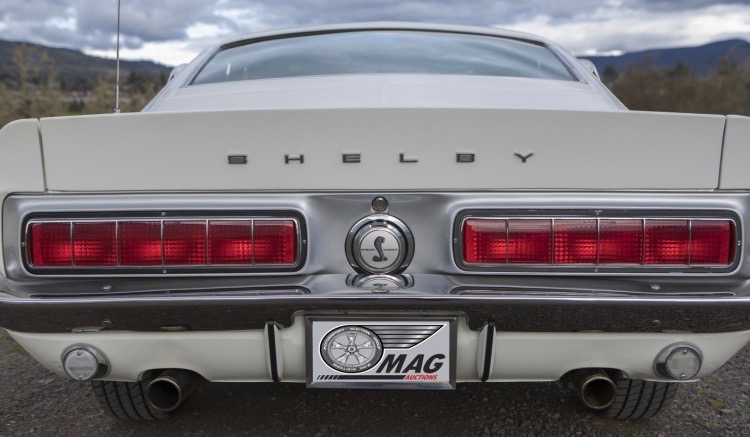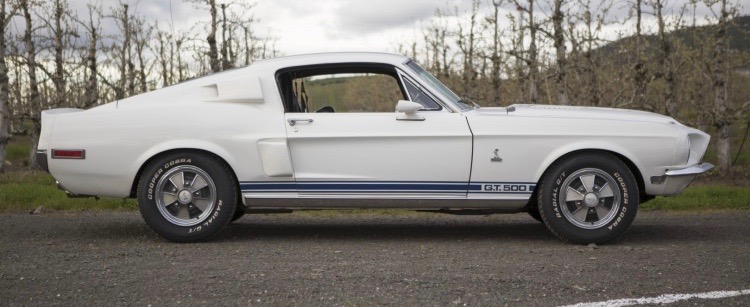
On June 1, we shared the tale of a 1968 Shelby GT500 Ford Mustang that had been stolen in 1970, was impounded 41 years later by a Mustang-savvy police officer, eventually went to court to have its ownership determined, and now would be offered up for bidding at the Motorsports Auction Group’s Hot August Nights sale August 10-12 in Reno, Nevada.
As they used to say, the switchboard lit up. The story drew massive interest among visitors to the Daily News at ClassicCars.com, and many of you left comments about the car’s post-recovery ownership status.
Several of you who left comments thought it was unfair that the Mustang hadn’t gone back to its original owner after its recovery. Some felt that way even though the original owner had received a financial settlement for the car from his insurance company, albeit for what the car was worth when it was stolen in 1970, not for its collector car marketplace value when it was recovered in 2011.

Because of the interest in the story and the fact that it illustrates several lessons for collector car owners, we’ve followed up on the tale.
First, the new news: Mike Oberle, consignment director for the auction company, says that Tim Sullivan, the now-retired San Mateo, California, police officer who first realized there was something not right about the car, will attend the MAG auction in August to discuss the case.
Oberle also said that after all the California court proceedings, the Mustang can be sold at the auction with a clear title for its next owner. A clear title, and a whale of a tale.
Oberle also provided some additional information about the car. As you know from our original story, Sullivan knew the car was a ’68 Mustang and pulled it over after learning that it was registered as a ’65. He had the car impounded after finding restoration parts for a ’68 Mustang in the car’s trunk, even though the driver contended that the car was indeed a ’65 that he’d gotten from his uncle.
Further, Oberle said, the car’s ownership was tied up for something like three years before a judge finally ruled that while the car had been stolen, the original owner had been paid by his insurance company, that there was no proof the driver knew the Mustang had been stolen, that the driver had invested in the car’s restoration and the car was, indeed, part of the uncle’s estate.
Oh, and the car is not consigned to the auction by the driver. He sold it almost immediately after the court awarded him clear ownership, Oberle added.

Those who thought the car should have been awarded to the insurance company, which had paid off the original owner, were correct, except for this complication — the insurance company had gone out of business in the meantime.
Which brings us to one of the lessons for collectors: Be careful with whom you insure your vehicles.
I remember a case here in Phoenix a few years ago. A car, my recollection is that it was a Chevelle SS 396, was stolen from the owner’s driveway. The insurance company paid off the owner, but since it was not insured as a collector car, the payoff was basically for a used Chevy and was far less than the car was worth in the marketplace.
But at least the company was still in business when the owner made his claim.
I contacted Jonathan Klinger, spokesman for Hagerty, the collector car insurance and valuation-tracking company, who noted that in insurance terms, the original owner of the Shelby GT500 had been “made whole” back in 1970.
True, I said, but wouldn’t a specialty insurance company like Hagerty, which tends to have a much closer relationship with its customers than the typical insurer, consider finding a way to reunite the car and its original owner, if for no other reason than the positive public relations benefit? While there is no legal obligation to do so, Klinger indicated that such arrangements might be made.
But Klinger brought up another lesson for collectors, and Oberle underscored its truth — know the history of the car you’re buying.
“Someone purchases a vehicle not knowing it was a stolen vehicle, there’s nothing illegal about their intentions,” Klinger said. “However, regardless of how you acquired it, the authorities have the right to seize it.”
Oberle said he had first-hand experience in such a case; he once bought a boat that turned out to have been stolen, and he not only lost the boat but was unable to recoup his money he’d paid for it.
“Do a background check,” Klinger said. “Run the VIN. You need to know it’s not on a stolen-vehicle data base. The burden ultimately lies on the person buying the vehicle.”





